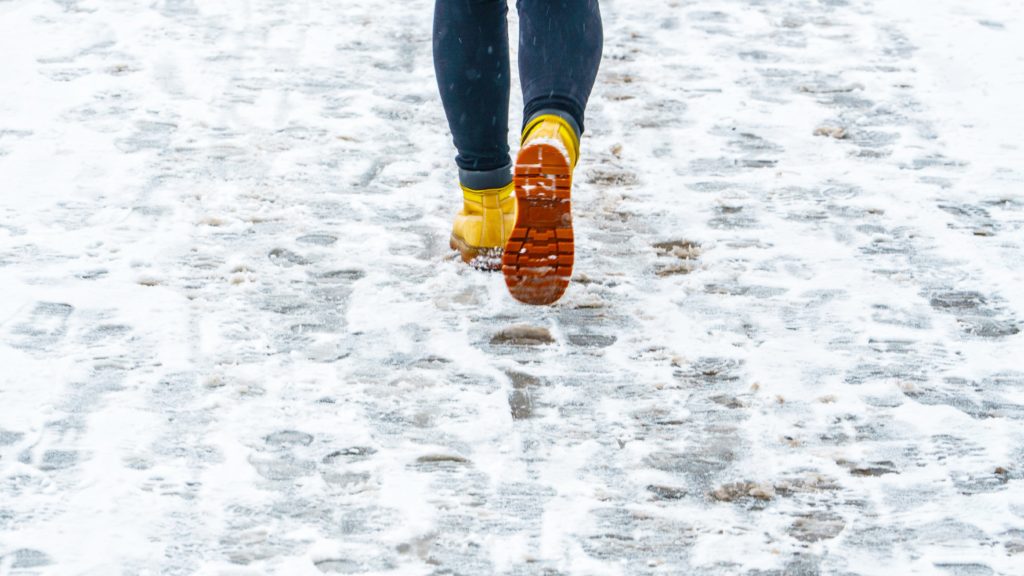Imagine yourself walking the streets of Old Saybrook. On your way to your favorite cafe on the Boston Post Road, you slip and fall on an ice-covered part of the sidewalk, sustaining injuries on your arm and hip.
While it’s important to call for medical assistance right away, you may be asking other questions, too. One will likely be who can be held liable for your injuries. Along the same lines, you may also be wondering who will cover your medical bills and lost wages today and in the future.
Slip and fall accidents are common in Connecticut and everywhere else in the country. The CDC documents more than 800,000 people end up in emergency rooms due to slip and fall injuries.
Slipping and falling can lead to severe injuries like hip, leg, and arm fractures. At their worst, slips and falls can result in spinal cord injuries and traumatic brain injuries.
Do not wait until a slip and fall incident catches you off guard. Read on to learn more about slips and falls in Connecticut and what you can do when these happen to you.
The Main Question: Who Is Liable?

In any situation where you are making a claim, liability is pivotal to the claims process. Compensation can come from the person or entity liable for your injuries. The insurance provider can also pay compensation for your injuries. Compensation in Connecticut for personal injuries can cover:
- Reimbursement for medical expenses
- Wage losses since the injuries may prevent you from working
- “Pain and suffering”
In Connecticut, liability can fall on the person who owns the area or property where you slipped or fell. This form of liability is Premises Liability. Premises liability provides that property owners who failed to ensure the safety of their areas of possession or jurisdiction can be accountable for injuries sustained by people lawfully on their property.
To prevent being sued for negligence, property owners need to keep their surroundings safe. The failure to do so is considered negligence under Connecticut’s slip and fall laws. Negligence by a property owner entitles an injured person to make a personal injury claim.
Proving Liability
If you file a claim, you need to prove that the other party is liable for your injuries. Proving negligence is key to a successful claim.
In Connecticut, you can only be awarded compensation after successfully proving the other party’s negligence. You must have evidence to prove negligence. Evidence includes:
- The presence of anything that makes an area dangerous
- That the owner of the premises knew or should have known of the area’s dangers
- That the owner of the premises failed to take action despite knowing of the area’s hazards
Can an Injured Person Be Liable for a Slip and Fall Accident?
In most cases, the property owner is the one who retains most of the accountability following an incident. However, Connecticut allows property owners to shift liability to the person who slipped and fell. And, through their legal counsel they can invoke the principle of Comparative Negligence.
To understand how comparative negligence works in Connecticut, let’s use an example.
Imagine that you left a nightclub with a blood alcohol concentration (BAC) of .1. By Connecticut standards, this is 0.02 above the legal threshold (which is .08). At this BAC, your likelihood of falling increases dramatically.
While intoxicated, you walk past a grocery store parking lot, lose consciousness, fall, and hit your head. The grocery store owner may have some liability over your injuries if they could have reasonably done something to make the area safer.
However, you may have more liability if your intoxication played a larger role in your injury (more than 50%). In this example, you cannot recover any compensation from the grocery store owner, regardless of how safe or unsafe the parking lot was.
The Comparative Negligence rule determines how much compensation you can recover. However, it can also aid the defendant, or property owner avoid having to compensate you if you played a greater than 50% part in causing your injury.
How Long You Have To File a Personal Injury Claim
Connecticut has a time frame for how long your injury claim can remain valid. This duration is codified as the state’s Statute of Limitations. According to Connecticut’s Limitation of Statutes, you have two years from the date of your injury to file a claim.
For this reason, you need to file your personal injury claim as soon as the other party shows an unwillingness to compensate you. You will need the help of experience slip and fall lawyers in Connecticut to maximize your chances of recovering compensation.
Slip and Fall Lawyers Can Help You Receive Compensation
In Connecticut, the claims process can be as complicated as it is long. Going about your personal injury claim on your own can be an uphill battle.
Leave nothing to chance by contacting the slip and fall lawyers at Jonathan Perkins Injury Lawyers. Our slip and fall lawyers can help you as you battle to receive what is fair.
Call us nowfor a Free Consultation about your slip and fall injury in Connecticut.
